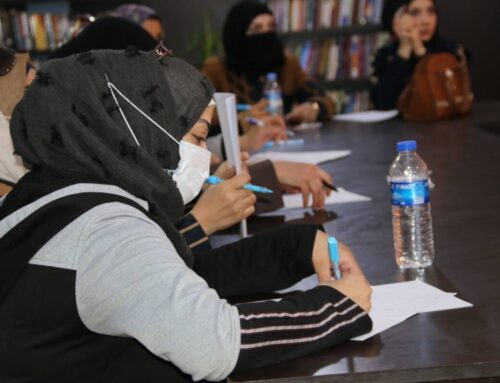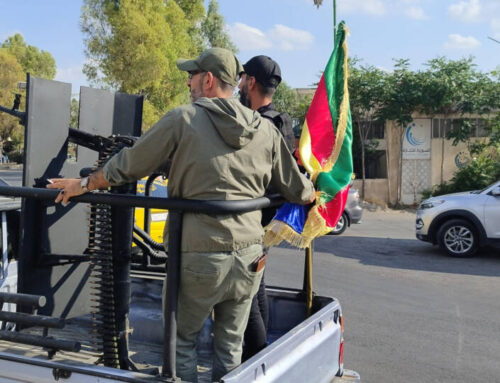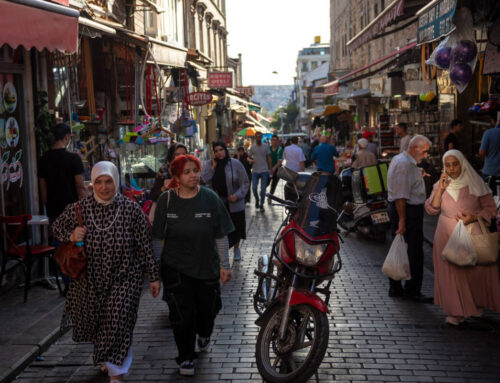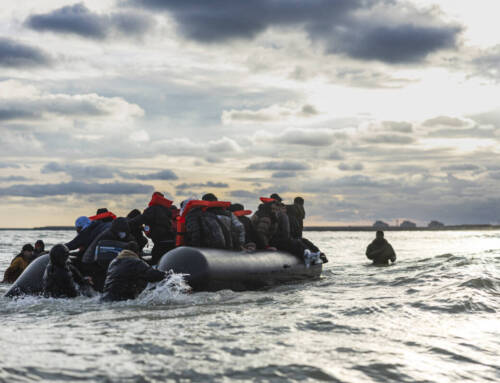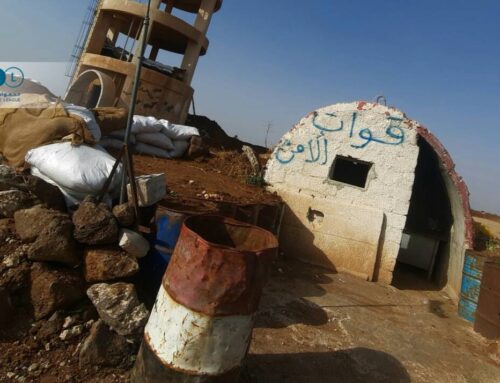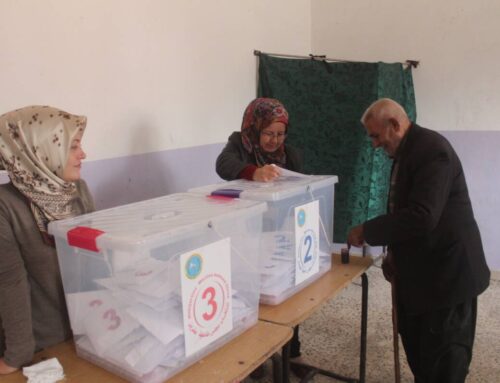10 things to know about the UK deal to deport asylum seekers to Rwanda
Fifteen Syrian asylum seekers are scheduled to be deported from the UK to Rwanda on June 14, in the flight inaugurating a controversial ‘offshoring’ deal with the east African country
2 June 2022
BEIRUT – Fifteen Syrian men are among an unspecified number of people scheduled to be deported from the United Kingdom to Rwanda on June 14 in the first flight of a controversial deal to send asylum seekers overseas, according to a UK charity.
The agreement to offshore asylum seekers, signed April 14, is the first of its kind in Europe. Human rights defenders have sharply criticized the deportation plan for its dubious legality and potential impact on refugee rights worldwide.
The prospect of being sent to Rwanda has also deeply distressed asylum seekers in the UK, with cases of attempted suicide reported among those notified of their deportation. Asylum seekers who went on hunger strike in protest have been threatened with faster deportation to Rwanda, according to a letter from the UK Home Office obtained by the Guardian.
Around 100 asylum seekers from different nationalities have received notices of deportation under the deal so far, a Syrian refugee rights activist in the UK told Syria Direct.
1. What is the UK-Rwanda deal?
The UK signed a Memorandum of Understanding with Rwanda in April to send asylum seekers to the east African country, where their asylum claim will be processed.
Asylum seekers granted asylum in Rwanda under the country’s asylum system are to remain there. In other words, the deal is not a matter of externalizing part of the asylum process, but about redirecting people who applied for protection in the UK thousands of miles away.
“Rwanda does not have the capacity to receive increased numbers of refugees, fairly and efficiently determine their asylum claims or provide long-term solutions,” Catherine Stubberfield, spokesperson for UNHCR United Kingdom, told Syria Direct.
Catherine Woollard, Director at the European Council on Refugees and Exiles (ECRE), warned of the possibility that someone at risk of persecution could be refused asylum in Rwanda. “The chances of getting a fair asylum hearing in Rwanda are not sufficient,” she said.
In exchange for processing asylum seekers, Rwanda’s government will receive a £120 million ($157 million) investment from the UK.
2. Which asylum seekers are affected?
Asylum seekers who arrived irregularly in the UK after January 1, 2022 may be affected by the agreement.
UK authorities will conduct an initial screening to decide which asylum seekers are sent to Rwanda. The Memorandum of Understanding states that “asylum seekers with a connection to a safe country or their home country” are to be deported.
Woollard said that the deal’s scope has been “probably deliberately kept vague” to minimize legal complaints. “Knowing who is subject to the deal, makes it more likely that there are legal challenges because you have more grounds for challenging,” she added.
“It is unclear that the kind of assessment that will take place [in the UK] will be robust enough to ensure that extremely vulnerable refugees don’t get sent to Rwanda,” said Nadia Hardman, a researcher in the Refugee and Migrants Rights Division at Human Rights Watch (HRW).
3. Is this deal legal?
UK Home Secretary Priti Patel has stated that offshoring refugees does not contravene the UN Refugee Convention. Many refugee rights experts disagree.
“It will be for the courts to decide on whether or not this is lawful,” Woollard said.
Several NGOs, such as Freedom from Torture, Detention Action and Care4Calais, have filed legal challenges against the UK-Rwanda agreement for breaching international law. Several asylum seekers have also challenged their deportation orders.
The trade union representing UK civil servants and border agency workers has also lodged a complaint. “For those people, the lack of clarity is very problematic because they don’t know if they are going to be involved in something that is illegal,” Woollard said.
“There are probably good prospects that the courts may rule that the deal itself is not lawful,” Woollard said, adding that “this deal, at the very least, goes against the spirit of the international refugee law.”
If the legal avenues in the UK are exhausted, the agreement could be challenged at the European Court of Human Rights in Strasbourg.
4. What happens once asylum seekers land in Rwanda?
Once in Rwanda, asylum seekers will be provided accommodation while their claim is being processed. If their application is granted, they will become refugees in Rwanda.
If the application is rejected, the scenario is grim.
The agreement states that Rwanda can deport a person six months after their asylum claim was rejected. In the case of Syrians, deportation to Syria would require a bilateral agreement between Rwanda and Damascus. “As far as we are aware, there’s no agreement or cooperation, but the great risk is that that changes,” Woollard explained.
Since Rwanda does not have a cooperation agreement so far with the Assad government, Syrians who lose their right to stay in Rwanda would be pushed to “irregularity, a situation of detention or limbo” in Rwanda, Woolard said.
“What is likely to happen in terms of Syrian returns, is probably a situation similar to what is happening in Denmark,” she added, referencing Denmark’s policy of stripping Syrian refugees of their residency permits and pushing them into legal limbo in departure centers.
Under the principle of non-refoulement in international law, “people should not be sent back to the place where they may face serious harm or torture,” Hardman said, adding that it is unclear how the cases of Syrians sent to Rwanda may unfold. “These are all going to be test cases,” she said.
The agreement also opens the door for Rwanda to send rejected asylum seekers “to a country that is not their country of origin,” Woollard noted, placing Rwanda in a position of “pressuring and providing financial support for another country to accept the people that are rejected.”
5. What are the implications for refugee rights?
UNHCR has opposed this deal externalizing the UK’s asylum responsibilities. “Such an attempt to avoid and shift responsibility for refugee protection risks undermining the international asylum system at large,” the agency’s UK spokesperson Stubberfield said. She warned the arrangement could “further increase pressure on frontline states, and would increase the risks of refugees resorting to dangerous onward journeys.”
“This deal is a race to the bottom in undermining international protection, we are worried that other countries will follow suit,” HRW researcher Hardman said.
ECRE director Woollard stressed that “it is not illegal for people to cross borders to seek protection. It is almost the opposite—countries that are [parties to] the Refugee Convention are not allowed to penalize people for irregularly crossing a border.”
6. Is Rwanda safe?
Rwanda has a dubious human rights record. In recent years, HRW has documented extrajudicial killings, suspicious deaths in custody, arbitrary detention, torture and cases of LGTBQI+ people being detained and beaten. In 2018, Rwandan authorities killed 12 Congolese refugees during a protest over cuts in food rations.
Despite this evidence, the UK government assessment of Rwanda’s security situation noted that “notwithstanding some restrictions on freedom of speech and/or freedom of association” there are “not substantial grounds” for believing refugees would be mistreated there.
7. Is there any precedent?
The UK-Rwanda deal is unprecedented in Europe, but not a global first. “There are some versions of these problematic agreements across the board,” Woollard said.
The closest example is Australia’s use since 2013 of offshore detention centers on the Nauru and Manus islands. The Australian model has been widely criticized for deaths among asylum seekers due to suicide, violence and medical negligence. Nauru still holds some asylum seekers, but the Manus Island deal scheme ended in 2021. “The way they have been treated in this detention center is a punitive way to deal with a claim to international protection,” Hardman said. “There are no successful examples of offshoring refugee protection.”
Israel once had agreements with Rwanda and Uganda to send rejected asylum seekers there, but the Israeli courts overturned them in 2018.
The Danish government passed a law last year allowing it to transfer asylum seekers to third countries outside the European Union, and also signed a deal with Rwanda last May. However, Woollard noted that the agreement is not like the UK deal, as Danish authorities are to process asylum seekers in Rwanda under the Danish asylum system
8. How many asylum seekers does the UK have?
According to 2021 UNHCR data, the UK hosts 135,912 refugees. Turkey, a country with less than one-third of the UK’s GDP, hosts 3.7 million refugees.
There are 25 countries that currently host more refugees than the UK. Around 85 percent of the world’s refugees are hosted by developing countries.
9. Why is the UK doing this?
Home Secretary Priti Patel announced the deal as a “part of our strategy to overhaul the broken asylum system and break the evil people-smugglers’ business model.”
HRW researcher Hardman questioned that reasoning. “Externalizing asylum is not going to stop the smuggling business, it’s shifting the responsibility,” she said.
“Past experience has also shown that those sent to Rwanda involuntarily will likely seek to depart again as quickly as possible, often facing serious threats,” added UNHCR UK spokesperson Stubberfield.
Domestic political concerns may also be playing a role. British Prime Minister Boris Johnson has been embroiled in a scandal dubbed “partygate” for breaking COVID-19 restrictions during the pandemic. “As soon as Boris Johnson lands himself in political hot water, his government makes a cruel new anti-refugee announcement, in a blatant attempt to stoke hatred and divert our attention elsewhere,” said Zoe Gardner, policy and advocacy manager at Join Council for the Welfare of Immigrants (JCWI), the UK organization that first reported the 15 Syrians affected by this scheme.
ECRE director Woollard noted that externalizing asylum is an “incredibly expensive approach—this is money that could be much better spent simply in making the asylum system function.”
10. Can the June 14 flight be stopped?
Individual legal challenges could suspend the deportation orders for some asylum seekers bound to board the plane. But there may not be enough time to stop the first round of deportations to Rwanda altogether. “If the legal challenges against the deal itself advance in the next two weeks, that could stop the flight because it will basically suspend the deal, but I think the timing is too short,” Woollard said.
She also noted that “demonstrations and direct action” are to be expected, as UK activists have tried to stop deportation flights in the past.


